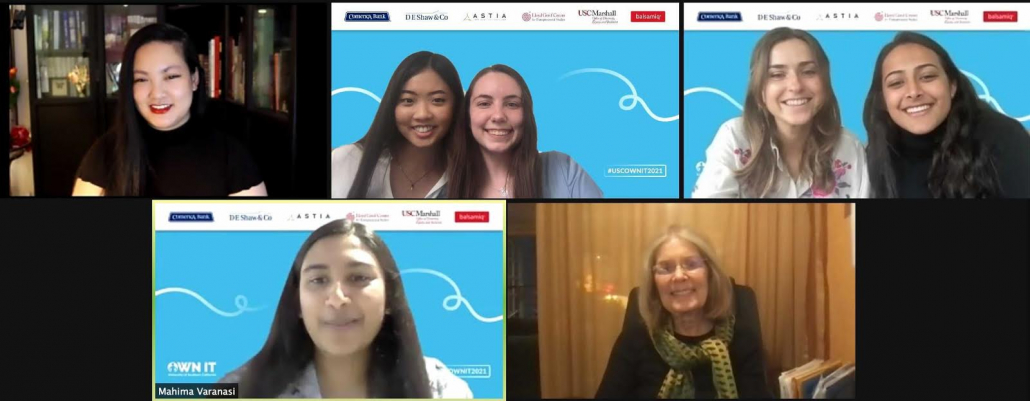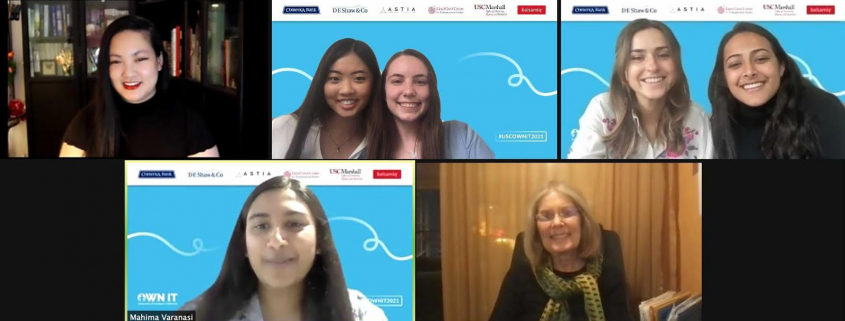USC OWN IT Leadership Summit empowers women and non-binary people amid pandemic

In the age of virtual events, USC OWN IT Executive Directors Ines Ramirez and Mitali Shanbhag grappled with how to pull together a conference dedicated to fostering a sense of community between women and nonbinary people.
OWN IT, a student-run non-profit organization that originated at Georgetown University, hosts an annual leadership summit in its various chapters dedicated to inspiring and advising female and non-binary leaders across all industries.
Ramirez said that the OWN IT team originally prepared for the summit to be a hybrid event, with the possibility of returning to in-person events by Spring 2021. The two-day summit, which took place last weekend, would typically feature in-person speakers at Bovard Auditorium, complimentary goodie bags for attendees and a chance to connect with other people who attend the conference.
However, the team ultimately chose to pivot to a fully virtual format, functioning mainly through an app called Whova, which allowed attendees to access webinar links to the various panels, engage with other participants in a public chat and even connect to panelists and moderators through a “Q&A/Say Hi!” feature.
“To be honest, it’s almost been like just creating a completely new event from scratch, so a lot of roles, [logistics and] responsibilities have changed,” Ramirez said. “We’ve kind of just adapted along the way.”
The digital summit brought challenges, but also created space for unique opportunities that simply couldn’t happen in person, Ramirez said. This year’s conference featured a diverse set of respected speakers including Gloria Steinem, prolific journalist, activist and keynote speaker, Shannon Watts, founder of Moms Demand Action for Gun Sense in America and Sophia Amoruso, founder of the clothing brand Nasty Gal.
“For the first time in [USC OWN IT] history, we have speakers, moderators, sponsors from literally all over the world joining us [from] different time zones, and coming together just because we all have these key values and this mission in common,” Shanbhag said.
The virtual format of the conference also meant that the conference had many more family members of both USC and non-USC students, according to Ramirez. In addition, the virtual conference allowed for flexibility in the sorts of events the team wanted to have, such as a opening workout session.
With the strain on mental health, rampant Zoom fatigue and constant threat to health and wellness brought on by the past year, mental and physical health was brought to the forefront of the conversations at this year’s summit. The Saturday portion of the summit opened with a workout session, followed by a workshop about the importance of flow states and a meditation session with Gillian Finely, a lecturer of ballet and pilates at the Kaufman School of Dance.
“I think the virtual summit has allowed us to do things like the workout class, where an attendee can participate in the workout and then they get 30 minutes, they can just jump upstairs, hop in the shower and then go downstairs, grab some breakfast. They don’t have to walk all the way back to their dorms and whatnot,” Ramirez said.
According to attendees, the virtual format of the conference did not hinder OWN IT 2021 from accomplishing its mission. Gabriella Margarino, a senior majoring in cognitive science, attended webinars for both days of the conference tuning into conversations about wellness, workplace confidence and enacting change.
“I haven’t felt as motivated and as supported by [a] female community in a really really long time, especially with [the coronavirus] and not being able to gather in spaces and have those female-centered conversations or communities as much,” Margarino said. “There were just so many women who were so willing to just lay out their story and support other women.”
Margarino referenced “The Power in Platforms: Enacting Change” panel with Alyson Stoner and Liz Hernandez, recalling that she had no expectations of what the panel would consist of, since she only knew Stoner from the movies and films from her childhood.
Now, Stoner is the founder of MovementGenius, a holistic fitness program that reconnects mind, body and being through creativity, and has led programming for major organizations such as the United Nations, the World Economic Forum and the World Health Organization.
Another noteworthy speaker who is known in the media and took on her own ventures was Julianne Hough, Emmy-winning dancer, musician and actress who also founded her own health and wellness experience brand, KINRGY (pronounced “kinergy”) and has concurrently engaged in numerous other philanthropic efforts.
As demonstrated by Stoner’s and Hough’s focus on mind and body connection, the conversations that they hosted were not the typical “how to advance your career” talk that many summits would focus on, Shanbhag said. The executive directors of OWN IT said this was a very deliberate choice when rolling out the programming for this year’s summit.
“I feel like we really did want to showcase an array of nontraditional and traditional career paths, because I think one thing you notice, especially now, is that there’s no direct path to success and there [are] so many definitions of success,” Shanbhag said. “I think by redefining what values that we hold near and dear to us, we were able to create a summit that represented those values and bring in speakers that represented those as well.”
Not only were the conversations illuminating, but the sessions managed to feel intimate despite being fully virtual, according to Maya Fine, a senior majoring in business administration. Fine moderated the “Careers in Consulting” breakout session with several businesswomen and said she appreciated the opportunity to hear their insights, as someone entering the consulting industry upon graduation. When comparing her experience at another virtual conference, Harvard University’s “Virtual Ventures in Management Program,“ she found this year’s OWN IT to be much more personal.
“It felt so much more intimate, like the size of the breakout panels, even in the webinars, I think they were a little more personalized because the target audience is so much more specific,” Fine said. “People wanted to participate and pay attention even though it was virtual.”
In addition to wellness-centered conversations and an emphasis on interconnectedness during the summit, several OWN IT panels featured women and nonbinary entrepreneurs detailing their business journey. One conversation, “Paving Paths: Making Room and Taking Space,” featured four women from very different spaces – technology, gun law reform, sexual health and skincare for Black women – but the conversation offered universal truths about navigating male-dominated industries and breaking through barriers of entry by conveying value to their ideas.
“I try to just meet them where they’re at,” said Beatrice Dixon, founder and CEO of feminine hygiene brand the Honey Pot Co. regarding the obstacles she faced in selling her product to a room full of men. Dixon advised young entrepreneurs to find a point of connection to women in the lives of the men she was selling to.
Almost all of the panels shared a common thread of unwavering support for women across all industries and a sense of sorority among the trailblazers in the event.
“I didn’t walk through a door just to close it for somebody else,” said Tiana Kara, executive director of BUILT BY GIRLS, an organization that helps female and non-binary students ages 15-22 get involved in technology by offering mentorship and guidance.
The diversity of the conference was bountiful, which Ramirez said was not a coincidence for this year’s summit in particular as the team seized the opportunity to elevate marginalized voices in nearly every panel of the conference.
“We set some goals for ourselves at the beginning of last summer of what we wanted our outreach to look like for sponsors, for speakers and for attendees,” Ramirez said. “We’re really proud to say that for our breakout panels, and for most of our speakers, we [surpassed] our goal of about 50% Black, indigenous, people of color speakers, so we’re really proud of that, but we still know that there are a lot of strides to make.”
Shanbhag said that the inspiration for an emphasis on showcasing marginalized voices had a personal connection to her. As an aspiring executive at a tech corporation, Shanbhag sees the power to enact change in the conversations featured at OWN IT.
“As a female person of color, I grew up really not seeing role models that looked like me in the positions that I hoped to be in one day when I was older … it was really hard for me to understand how my career path would look just on a personal level,” Shanbhag said. “I think that’s where change starts, starting these difficult conversations, showcasing intersecting identities and redefining our values of what really is important to us.”

